- Home
- Louisa May Alcott
Good Wives Page 13
Good Wives Read online
Page 13
"Let me mend them," said I. "I don't mind it, and he needn't know. I'd like to, he's so kind to me about bringing my letters and lending books."
So I have got his things in order, and knit heels into two pairs of the socks, for they were boggled out of shape with his queer darns. Nothing was said, and I hoped he wouldn't find it out, but one day last week he caught me at it. Hearing the lessons he gives to others has interested and amused me so much that I took a fancy to learn; for Tina runs in and out, leaving the door open, and I can hear. I had been sitting near this door, finishing off the last sock, and trying to understand what he said to a new scholar, who is as stupid as I am. The girl had gone, and I thought he had also, it was so still, and I was busily gabbling over a verb, and rocking to and fro in a most absurd way, when a little crow made me look up, and there was Mr. Bhaer looking and laughing quietly, while he made signs to Tina not to betray him.
"So!" he said, as I stopped and stared like a goose, "you peep at me, I peep at you, and this is not bad, but see, I am not pleasanting when I say, haf you a wish for German?"
"Yes, but you are too busy. I am too stupid to learn," I blundered out, as red as a peony.
CHAPTER 10. Jo's Journal
61
Good Wives
"Prut! We will make the time, and we fail not to find the sense. At efening I shall gif a little lesson with much gladness, for look you, Mees Marsch, I haf this debt to pay." And he pointed to my work `Yes, ' they say to one another, these so kind ladies, `he is a stupid old fellow, he will see not what we do, he will never observe that his sock heels go not in holes any more, he will think his buttons grow out new when they fall, and believe that strings make theirselves.' "Ah! But I haf an eye, and I see much. I haf a heart, and I feel thanks for this. Come, a little lesson then and now, or no more good fairy works for me and mine."
Of course I couldn't say anything after that, and as it really is a splendid opportunity, I made the bargain, and we began. I took four lessons, and then I stuck fast in a grammatical bog. The Professor was very patient with me, but it must have been torment to him, and now and then he'd look at me with such an expression of mild despair that it was a toss−up with me whether to laugh or cry. I tried both ways, and when it came to a sniff or utter mortification and woe, he just threw the grammar on to the floor and marched out of the room. I felt myself disgraced and deserted forever, but didn't blame him a particle, and was scrambling my papers together, meaning to rush upstairs and shake myself hard, when in he came, as brisk and beaming as if I'd covered myself in glory.
"Now we shall try a new way. You and I will read these pleasant little MŠarchen together, and dig no more in that dry book, that goes in the corner for making us trouble."
He spoke so kindly, and opened Hans Andersons's fairy tales so invitingly before me, that I was more ashamed than ever, and went at my lesson in a neck−or−nothing style that seemed to amuse him immensely. I forgot my bashfulness, and pegged away (no other word will express it) with all my might, tumbling over long words, pronouncing according to inspiration of the minute, and doing my very best. When I finished reading my first page, and stopped for breath, he clapped his hands and cried out in his hearty way, "Das ist gut!' Now we go well! My turn. I do him in German, gif me your ear." And away he went, rumbling out the words with his strong voice and a relish which was good to see as well as hear. Fortunately the story was the CONSTANT TIN SOLDIER, which is droll, you know, so I could laugh, and I did, though I didn't understand half he read, for I couldn't help it, he was so earnest, I so excited, and the whole thing so comical.
After that we got on better, and now I read my lessons pretty well, for this way of studying suits me, and I can see that the grammar gets tucked into the tales and poetry as one gives pills in jelly. I like it very much, and he doesn't seem tired of it yet, which is very good of him, isn't it? I mean to give him something on Christmas, for I dare not offer money. Tell me something nice, Marmee.
I'm glad Laurie seems so happy and busy, that he has given up smoking and lets his hair grow. You see Beth manages him better than I did. I'm not jealous, dear, do your best, only don't make a saint of him. I'm afraid I couldn't like him without a spice of human naughtiness. Read him bits of my letters. I haven't time to write much, and that will do just as well. Thank Heaven Beth continues so comfortable.
JANUARY
A Happy New Year to you all, my dearest family, which of course includes Mr. L. and a young man by the name of Teddy. I can't tell you how much I enjoyed your Christmas bundle, for i didn't get it till night and had given up hoping. Your letter came in the morning, but you said nothing about a parcel, meaning it for a surprise, so I was disappointed, for I'd had àkind of feeling' that you wouldn't forget me. I felt a little low in my mind as I sat up in my room after tea, and when the big, muddy, battered−looking bundle was brought to me, I just hugged it and pranced. It was so homey and refreshing that I sat down on the floor and read and looked and ate and laughed and cried, in my usual absurd way. The things were just what I wanted, and all the better for being made instead of bought. Beth's new ìnk bib' was capital, and Hannah's box of hard gingerbread will be a treasure. I'll be sure and wear the nice flannels you sent, Marmee, and read carefully the books Father has marked. Thank you all, heaps and heaps!
CHAPTER 10. Jo's Journal
62
Good Wives
Speaking of books reminds me that I'm getting rich in that line, for on New Year's Day Mr. Bhaer gave me a fine Shakespeare. It is one he values much, and I've often admired it, set up in the place of honor with his German Bible, Plato, Homer, and Milton, so you may imagine how I felt when he brought it down, without its cover, and showed me my own name in it, "from my friend Friedrich Bhaer".
"You say often you wish a library. Here I gif you one, for between these lids (he meant covers) is many books in one. Read him well, and he will help you much, for the study of character in this book will help you to read it in the world and paint it with your pen."
I thanked him as well as I could, and talk now about `my library', as if I had a hundred books. I never knew how much there was in Shakespeare before, but then I never had a Bhaer to explain it to me. Now don't laugh at his horrid name. It isn't pronounced either Bear or Beer, as people will say it, but something between the two, as only Germans can give it. I'm glad you both like what I tell you about him, and hope you will know him some day. Mother would admire his warm heart, Father his wise head. I admire both, and feel rich in my new `friend Friedrich Bhaer'.
Not having much money, or knowing what he'd like, I got several little things, and put them about the room, where he would find them unexpectedly. They were useful, pretty, or funny, a new standish on his table, a little vase for his flower, he always has one, or a bit of green in a glass, to keep him fresh, he says, and a holder for his blower, so that he needn't burn up what Amy calls `mouchoirs'. I made it like those Beth invented, a big butterfly with a fat body, and black and yellow wings, worsted feelers, and bead eyes. It took his fancy immensely, and he put it on his mantlepiece as an article of vertu, so it was rather a failure after all.
Poor as he is, he didn't forget a servant or a child in the house, and not a soul here, from the French laundrywoman to Miss Norton forgot him. I was so glad of that.
They got up a masquerade, and had a gay time New Year's Eve. I didn't mean to go down, having no dress.
But at the last minute, Mrs. Kirke remembered some old brocades, and Miss Norton lent me lace and feathers. So I dressed up as Mrs. Malaprop, and sailed in with a mask on. No one knew me, for I disguised my voice, and no one dreamed of the silent, haughty Miss March (for they think I am very stiff and cool, most of them, and so I am to whippersnappers) could dance and dress, and burst out into ànice derangement of epitaphs, like an allegory on the banks of the Nile'. I enjoyed it very much, and when we unmasked it was fun to see them stare at me. I heard one of the young men tell another that he knew I'd been an actress, in fact
, he thought he remembered seeing me at one of the minor theaters. Meg will relish that joke. Mr. Bhaer was Nick Bottom, and Tina was Titania, a perfect little fairy in his arms. To see them dance was `quite a landscape', to use a Teddyism.
I had a very happy New Year, after all, and when I thought it over in my room, I felt as if I was getting on a little in spite of my many failures, for I'm cheerful all the time now, work with a will, and take more interest in other people than I used to, which is satisfactory. Bless you all! Ever your loving...
Jo
CHAPTER 11. A Friend
Though very happy in the social atmosphere about her, and very busy with the daily work that earned her bread and made it sweeter for the effort, Jo still found time for literary labors. The purpose which now took possession of her was a natural one to a poor and ambitious girl, but the means she took to gain her end were not the best. She saw that money conferred power, therefore, she resolved to have, not to be used for herself alone, but for those whom she loved more than life.
CHAPTER 11. A Friend
63
Good Wives
The dream of filling home with comforts, giving Beth everything she wanted, from strawberries in winter to an organ in her bedroom, going abroad herself, and always having more than enough, so that she might indulge in the luxury of charity, had been for years Jo's most cherished castle in the air.
The prize−story experience had seemed to open a way which might, after long traveling and much uphill work, lead to this delightful chateau en Espagne. But the novel disaster quenched her courage for a time, for public opinion is a giant which has frightened stouter−hearted Jacks on bigger beanstalks than hers. Like that immortal hero, she reposed awhile after the first attempt, which resulted in a tumble and the least lovely of the giant's treasures, if I remember rightly. But the ùp again and take another' spirit was as strong in Jo as in Jack, so she scrambled up on the shady side this time and got more booty, but nearly left behind her what was far more precious than the moneybags.
She took to writing sensation stories, for in those dark ages, even all−perfect America read rubbish. She told no one, but concocted àthrilling tale', and boldly carried it herself to Mr. Dashwood, editor of the Weekly Volcano. She had never read Sartor Resartus , but she had a womanly instinct that clothes possess an influence more powerful over many than the worth of character or the magic of manners. So she dressed herself in her best, and trying to persuade herself that she was neither excited nor nervous, bravely climbed two pairs of dark and dirty stairs to find herself in a disorderly room, a cloud of cigar smoke, and the presence of three gentlemen, sitting with their heels rather higher than their hats, which articles of dress none of them took the trouble to remove on her appearance. somewhat daunted by this reception, Jo hesitated on the threshold, murmuring in much embarrassment...
"Excuse me, I was looking for the Weekly Volcano office. I wished to see Mr. Dashwood."
Down went the highest pair of heels, up rose the smokiest gentleman, and carefully cherishing his cigar between his fingers, he advanced with a nod and a countenance expressive of nothing but sleep. Feeling that she must get through the matter somehow, Jo produced her manuscript and, blushing redder and redder with each sentence, blundered out fragments of the little speech carefully prepared for the occasion.
"A friend of mine desired me to offera storyjust as an experimentwould like your opinionbe glad to write more if this suits."
While she blushed and blundered, Mr. Dashwood had taken the manuscript, and was turning over the leaves with a pair of rather dirty fingers, and casting critical glances up and down the neat pages.
"Not a first attempt, I take it?" observing that the pages were numbered, covered only on one side, and not tied up with a ribbonsure sign of a novice.
"No, sir. She has had some experience, and got a prize for a tale in the Blarneystone Banner."
"Oh, did she?" And Mr. Dashwood gave JO a quick look, which seemed to take note of everything she had on, from the bow in her bonnet to the buttons on her boots. "Well, you can leave it, if you like. We've more of this sort of thing on hand than we know what to do with at present, but I'll run my eye over it, and give you an answer next week."
Now, Jo did not like to leave it, for Mr. Dashwood didn't suit her at all, but, under the circumstances, there was nothing for her to do but bow and walk away, looking particularly tall and dignified, as she was apt to do when nettled or abashed. Just then she was both, for it was perfectly evident from the knowing glances exchanged among the gentlemen that her little fiction of `my friend' was considered a good joke, and a laugh, produced by some inaudible remark of the editor, as he closed the door, completed her discomfiture. Half resolving never to return, she went home, and worked off her irritation by stitching pinafores vigorously, and CHAPTER 11. A Friend
64
Good Wives
in an hour or two was cool enough to laugh over the scene and long for next week.
When she went again, Mr. Dashwood was alone, whereat she rejoiced. Mr. Dashwood was much wider awake than before, which was agreeable and Mr. Dashwood was not too deeply absorbed in a cigar to remember his manners, so the second interview was much more comfortable than the first.
"We'll take this (editors never say I), if you don't object to a few alterations. It's too long, but omitting the passages I've marked will make it just the right length," he said, in a businesslike tone.
Jo hardly knew her own MS again, so crumpled and underscored were its pages and paragraphs, but feeling as a tender patent might on being asked to cut off her baby's legs in order that it might fit into a new cradle, she looked at the marked passages and was surprised to find that all the moral reflectionswhich she had carefully put in as ballast for much romancehad been stricken out.
"But, Sir, I thought every story should have some sort of a moral, so I took care to have a few of my sinners repent."
Mr. Dashwoods's editorial gravity relaxed into a smile, for Jo had forgotten her `friend', and spoken as only an author could.
"People want to be amused, not preached at, you know. Morals don't sell nowadays." Which was not quite a correct statement, by the way.
"You think it would do with these alterations, then?"
"Yes, it's a new plot, and pretty well worked uplanguage good, and so on," was Mr. Dashwood's affable reply.
"What do youthat is, what compensation" began Jo, not exactly knowing how to express herself.
"Oh, yes, well, we give from twenty−five to thirty for things of this sort. Pay when it comes out," returned Mr. Dashwood, as if that point had escaped him. Such trifles do escape the editorial mind, it is said.
"Very well, you can have it," said Jo, handing back the story with a satisfied air, for after the dollar−a−column work, even twenty−five seemed good pay.
"Shall I tell my friend you will take another if she has one better than this?" asked Jo, unconscious of her little slip of the tongue, and emboldened by her success.
"Well, we'll look at it. Can't promise to take it. Tell her to make it short and spicy, and never mind the moral.
What name would your friend like to put on it?" in a careless tone.
"None at all, if you please, she doesn't wish her name to appear and has no nom de plume," said Jo, blushing in spite of herself.
"Just as she likes, of course. The tale will be out next week. Will you call for the money, or shall I send it?"
asked Mr. Dashwood, who felt a natural desire to know who his new contributor might be.
"I'll call. Good morning, Sir."
CHAPTER 11. A Friend
65
Good Wives
As she departed, Mr. Dashwood put up his feet, with the graceful remark, "Poor and proud, as usual, but she'll do."
Following Mr. Dashwood's directions, and making Mrs. Northbury her model, Jo rashly took a plunge into the frothy sea of sensational literature, but thanks to the life preserver thrown her by a friend, she came up aga
in not much the worse for her ducking.
Like most young scribblers, she went abroad for her characters and scenery, and banditti, counts, gypsies, nuns, and duchesses appeared upon her stage, and played their parts with as much accuracy and spirit as could be expected. Her readers were not particular about such trifles as grammar, punctuation, and probability, and Mr. Dashwood graciously permitted her to fill his columns at the lowest prices, not thinking it necessary to tell her that the real cause of his hospitality was the fact that one of his hacks, on being offered higher wages, had basely left him in the lurch.
She soon became interested in her work, for her emaciated purse grew stout, and the little hoard she was making to take Beth to the mountains next summer grew slowly but surely as the weeks passed. One thing disturbed her satisfaction, and that was that she did not tell them at home. She had a feeling that Father and Mother would not approve, and preferred to have her own way first, and beg pardon afterward. It was easy to keep her secret, for no name appeared with her stories. Mr. Dashwood had of course found it out very soon, but promised to be dumb, and for a wonder kept his word.
She thought it would do her no harm, for she sincerely meant to write nothing of which she would be ashamed, and quieted all pricks of conscience by anticipations of the happy minute when she should show her earnings and laugh over her well−kept secret.
But Mr. Dashwood rejected any but thrilling tales, and as thrills could not be produced except by harrowing up the souls of the readers, history and romance, land and sea, science and art, police records and lunatic asylums, had to be ransacked for the purpose. Jo soon found that her innocent experience had given her but few glimpses of the tragic world which underlies society, so regarding it in a business light, she set about supplying her deficiencies with characteristic energy. Eager to find material for stories, and bent on making them original in plot, if not masterly in execution, she searched newspapers for accidents, incidents, and crimes. She excited the suspicions of public librarians by asking for works on poisons. She studied faces in the street, and characters, good, bad, and indifferent, all about her. She delved in the dust of ancient times for facts or fictions so old that they were as good as new, and introduced herself to folly, sin, and misery, as well as her limited opportunities allowed. She thought she was prospering finely, but unconsciously she was beginning to desecrate some of the womanliest attributes of a woman's character. She was living in bad society, and imaginary though it was, its influence affected her, for she was feeding heart and fancy on dangerous and unsubstantial food, and was fast brushing the innocent bloom from her nature by a premature acquaintance with the darker side of life, which comes soon enough to all of us.

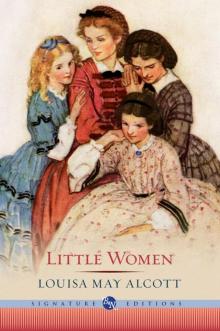 Little Women
Little Women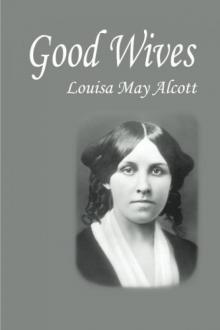 Good Wives
Good Wives Jo's Boys
Jo's Boys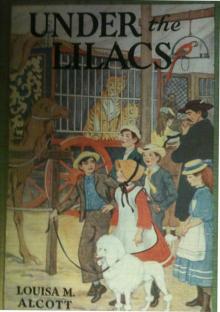 Under the Lilacs
Under the Lilacs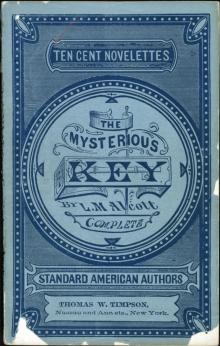 The Mysterious Key and What It Opened
The Mysterious Key and What It Opened The Inheritance
The Inheritance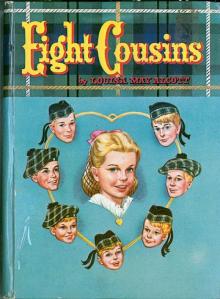 Eight Cousins
Eight Cousins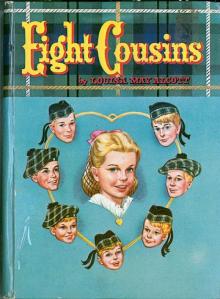 Eight Cousins; Or, The Aunt-Hill
Eight Cousins; Or, The Aunt-Hill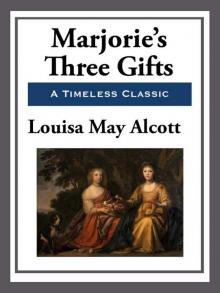 Marjorie's Three Gifts
Marjorie's Three Gifts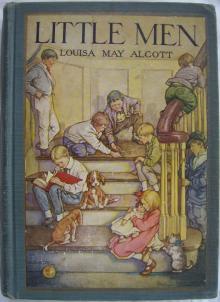 Little Men
Little Men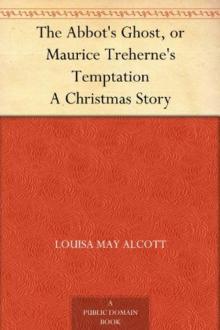 The Abbot's Ghost, or Maurice Treherne's Temptation: A Christmas Story
The Abbot's Ghost, or Maurice Treherne's Temptation: A Christmas Story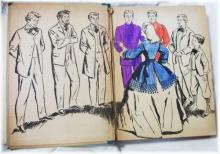 Rose in Bloom
Rose in Bloom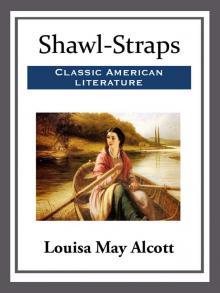 Shawl-Straps
Shawl-Straps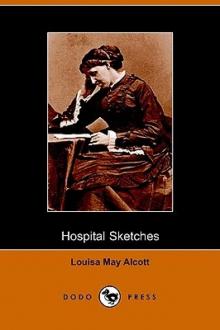 Hospital Sketches
Hospital Sketches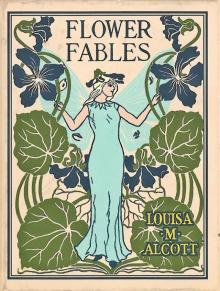 Flower Fables
Flower Fables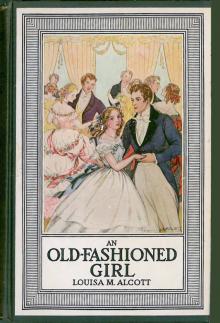 An Old-Fashioned Girl
An Old-Fashioned Girl The Candy Country
The Candy Country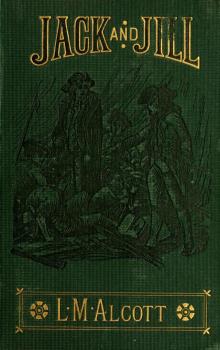 Jack and Jill
Jack and Jill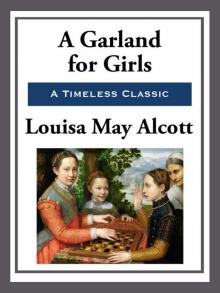 A Garland for Girls
A Garland for Girls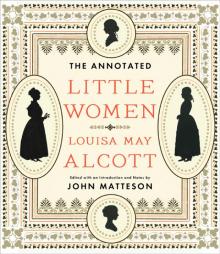 The Annotated Little Women
The Annotated Little Women A Classic Christmas
A Classic Christmas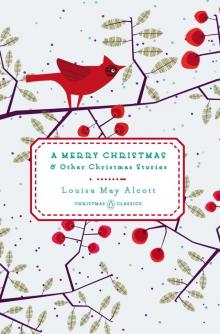 A Merry Christmas
A Merry Christmas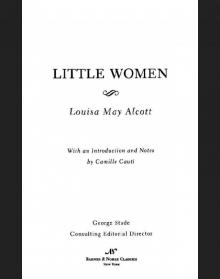 Little Women (Barnes & Noble Classics Series)
Little Women (Barnes & Noble Classics Series)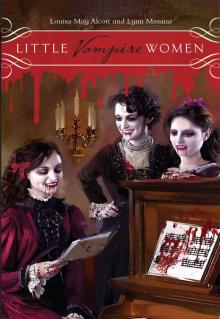 Little Vampire Women
Little Vampire Women